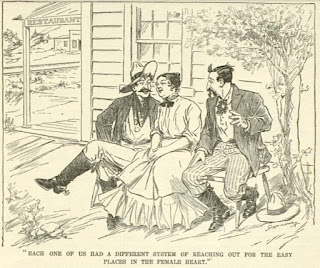Full House (Chapter 4: The Ransom of the Red Chief, minute 1.05.15)
SUMMARY
Bill and Sam had all of a sudden an idea, or, better, an inspiration, and this idea was kidnapping a child and getting a lot of money for his ransom. They looked for a very calm and quiet place far from the bustling and populated cities. Then they choose a wealthy citizen with a lovely child. They also looked for a place to keep the hostage until they get the ransom.
They found their prey and took him, but the boy
fought back. In the end they could carry him to their hideaway. However the boy, once in the cave in the
mountains, enjoyed the situation: he was camping out, nothing he ever did, and
felt happy and started to play pretending he was an Indian, the Red Chief. He
demanded that the two kidnappers played with him. He was so excited that nobody
went to sleep until the small hours of the morning. Bill and Sam knew that the boy wouldn’t
escape.
The next day he got up very early
and started to play Indians again. He was trying to cut Bill’s scalp. Sam saw
it just in time to take the knife from the boy’s hands. Sam also had to be
watchful because the “Red Chief” had said he (Sam) was to be tied to a stake
and burned to death.
Bill and Sam expected that patrols
would roam around the country and the mountains searching for the boy, but the
landscape was quiet as ever.
The boy attacked Bill again and Sam had to restore peace. But the child went on being mischievous, especially with Bill.
Sam decided to immediately send a
message to the father asking for the ransom and giving instructions about how
to pay it and recover the boy, the time and the place. He went to another
village to send the message, and all was suspiciously calm too.
When he got back to the cave, the
boy wasn’t an Indian anymore: he was a scout, and Bill his horse. Bill had to
carry the boy on his back for a long way and now he was exhausted. So, he couldn’t
bear the boy anymore and decided on the spot to send him home and forget about
all the business. But unfortunately for Bill, the boy came back to the
kidnappers: he was having such a great time!
Sam asked Bill to have a bit more patience: at night the business will be completed, and they would get rich and free from the naughty boy.
At the right time and the right place, a messenger arrived by bike. But, instead of the ransom, he left a note in the place. It was from the father, and it said…
QUESTIONS
What do you know about Stockholm
syndrome?
What can we make of King Herod
legend?
What is your opinion about
educating children at home and not going to school?
VOCABULARY
flannel-cake, undeleterious,
Maypole, philoprogenitoveness, lackadaisical, bloodhounds, passer and
forecloser, brake, hitched, court-plaster, buzzard, warpath, broiled, possum,
pesky, rubber for, pard, imp, dote on, yeomanry, dun, fold, niggerhead,
stockade, foil, hoss, chawbacons, whiskerando, yodel, wabbled, oats, Bedlam,
ewe, leech, calliope







